

Pondering AI
Kimberly Nevala, Strategic Advisor - SAS
How is the use of artificial intelligence (AI) shaping our human experience?
Kimberly Nevala ponders the reality of AI with a diverse group of innovators, advocates and data scientists. Ethics and uncertainty. Automation and art. Work, politics and culture. In real life and online. Contemplate AI’s impact, for better and worse.
All presentations represent the opinions of the presenter and do not represent the position or the opinion of SAS.
Kimberly Nevala ponders the reality of AI with a diverse group of innovators, advocates and data scientists. Ethics and uncertainty. Automation and art. Work, politics and culture. In real life and online. Contemplate AI’s impact, for better and worse.
All presentations represent the opinions of the presenter and do not represent the position or the opinion of SAS.
Episodes
Mentioned books

Apr 3, 2024 • 45min
The AI Experience with Sarah Gibbons and Kate Moran
Sarah Gibbons and Kate Moran riff on the experience of using current AI tools, how AI systems may change our behavior and the application of AI to human-centered design. Sarah and Kate share their non-linear paths to becoming leading user experience (UX) designers. Defining the human-centric mindset Sarah stresses that intent is design and we are all designers. Kate and Sarah then challenge teams to resist short-term problem hunting for AI alone. This leads to an energized and frank debate about the tensions created by broad availability of AI tools with “shitty” user interfaces, why conversational interfaces aren’t the be-all-end-all and whether calls for more discernment and critical thinking are reasonable or even new. Kate and Sara then discuss their research into our nascent AI mental models and emergent impacts on user behavior. Kate discusses how AI can be used for UX design along with some far-fetched claims. Finally, both Kate and Sara share exciting areas of ongoing research. Sarah Gibbons and Kate Moran are Vice Presidents at Nielson Norman Group where they lead strategy, research, and design in the areas of human-centered design and user experience (UX). A transcript of this episode is here.

Mar 20, 2024 • 38min
Tech, Prosperity and Power with Simon Johnson
Simon Johnson takes on techno-optimism, the link between technology and human well-being, the law of intended consequences, the modern union remit and political will.In this sobering tour through time, Simon proves that widespread human flourishing is not intrinsic to tech innovation. He challenges the ‘productivity bandwagon’ (an economic maxim so pervasive it did not have a name) and shows that productivity and market polarization often go hand-in-hand. Simon also views big tech’s persuasive powers through the lens of OpenAI’s board debacle.Kimberly and Simon discuss the heyday of shared worker value, the commercial logic of automation and augmenting human work with technology. Simon highlights stakeholder capitalism’s current view of labor as a cost rather than people as a resource. He underscores the need for active attention to task creation, strong labor movements and participatory political action (shouting and all). Simon believes that shared prosperity is possible. Make no mistake, however, achieving it requires wisdom and hard work.Simon Johnson is the Head of the Economics and Management group at MIT’s Sloan School of Management. Simon co-authored the stellar book “Power and Progress: Our 1,000 Year Struggle Over Technology and Prosperity with Daren Acemoglu.A transcript of this episode is here.

Mar 6, 2024 • 45min
Raising Robots with Professor Rose Luckin
Professor Rose Luckin provides an engaging tutorial on the opportunities, risks, and challenges of AI in education and why AI raises the bar for human learning. Acknowledging AI’s real and present risks, Rose is optimistic about the power of AI to transform education and meet the needs of diverse student populations. From adaptive learning platforms to assistive tools, Rose highlights opportunities for AI to make us smarter, supercharge learner-educator engagement and level the educational playing field. Along the way, she confronts overconfidence in AI, the temptation to offload challenging cognitive workloads and the risk of constraining a learner’s choices prematurely. Rose also adroitly addresses conflicting visions of human quantification as the holy grail and the seeds of our demise. She asserts that AI ups the ante on education: how else can we deploy AI wisely? Rising to the challenge requires the hard work of tailoring strategies for specific learning communities and broad education about AI itself. Rose Luckin is a Professor of Learner Centered Design at the UCL Knowledge Lab and Founder of EDUCATE Ventures Research Ltd., a London hub for educational technology start-ups, researchers and educators involved in evidence-based educational technology and leveraging data and AI for educational benefit. Explore Rose’s 2018 book Machine Learning and Human Intelligence (free after creating account) and the EDUCATE Ventures newsletter The Skinny. A transcript of this episode is here.

Feb 21, 2024 • 39min
The State of Play in AI Ethics with Katrina Ingram
Katrina Ingram addresses AI power dynamics, regulatory floors and ethical ceilings, inevitability narratives, self-limiting predictions, and public AI education. Katrina traces her career from communications to her current pursuits in applied AI ethics. Showcasing her way with words, Katrina dissects popular AI narratives. While contemplating AI FOMO, she cautions against an engineering mentality and champions the power to say ‘no.’ Katrina contrasts buying groceries with AI solutions and describes regulations as the floor and ethics as the ceiling for responsible AI. Katrina then considers the sublimation of AI ethics into AI safety and risk management, whether Sci-Fi has led us astray and who decides what. We also discuss the law of diminishing returns, the inevitability narrative around AI, and how predictions based on the past can narrow future possibilities. Katrina commiserates with consumers but cautions against throwing privacy to the wind. Finally, she highlights the gap in funding for public education and literacy. Katrina Ingram is the Founder & CEO Ethically Aligned AI, a Canadian consultancy enabling organizations to practically apply ethics in their AI pursuits. A transcript of this episode is here.
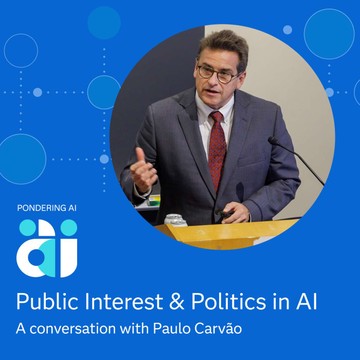
Feb 7, 2024 • 46min
Public Interest, Politics and Privacy with Paulo Carvão
Paulo Carvão discusses AI’s impact on the public interest, emerging regulatory schemes, progress over perfection, and education as the lynchpin for ethical tech. In this thoughtful discussion, Paulo outlines the cultural, ideological and business factors underpinning the current data economy. An economy in which the manipulation of personal data into private corporate assets is foundational. Opting for optimism over cynicism, Paul advocates for a first principles approach to ethical development of AI and emerging tech. He argues that regulation creates a positive tension that enables innovation. Paulo examines the emerging regulatory regimes of the EU, the US and China. Preferencing progress over perfection, he describes why regulating technology for technology’s sake is fraught. Acknowledging the challenge facing existing school systems, Paulo articulates the foundational elements required of a ‘bilingual’ education to enable future generations to “do the right things.” Paulo Carvão is a Senior Fellow at the Harvard Advanced Leadership Initiative, a global tech executive and investor. Follow his writings and subscribe to his newsletter on the Tech and Democracy substack. A transcript of this episode is here.
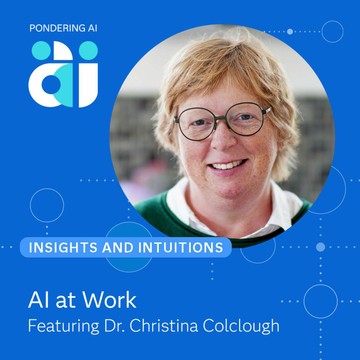
Dec 22, 2023 • 15min
AI at Work w/ Christina Colclough
Dr. Christina Jayne Colclough reflects on AI Regulations at Work.In this capsule series, prior guests share their insights on current happenings in AI and intuitions about what to expect next.
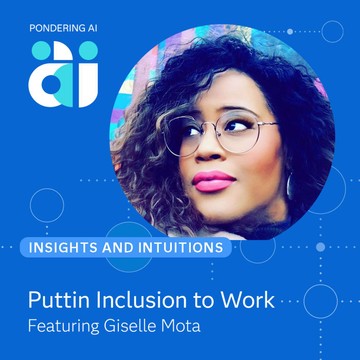
Dec 21, 2023 • 12min
Putting Inclusion To Work w/ Giselle Mota
Giselle Mota reflects on Inclusion at Work in the age of AI.In this capsule series, prior guests share their insights on current happenings in AI and intuitions about what to expect next.
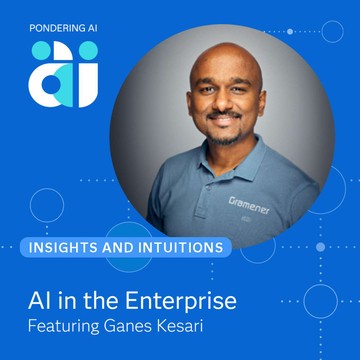
Dec 20, 2023 • 10min
GAI in the Enterprise w/ Ganes Kesari
Ganes Kesari reflects on generative AI (GAI) in the Enterprise.In this capsule series, prior guests share their insights on current happenings in AI and intuitions about what to expect next.
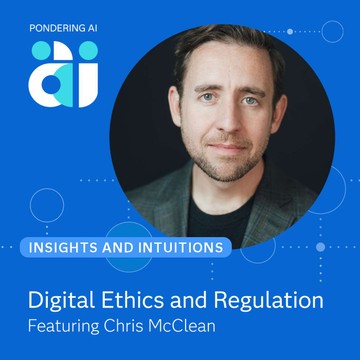
Dec 19, 2023 • 13min
Digital Ethics and Regulation w/ Chris McClean
Chris McClean reflects on Digital Ethics and Regulation in AI today.In this capsule series, prior guests share their insights on current happenings in AI and intuitions about what to expect next.
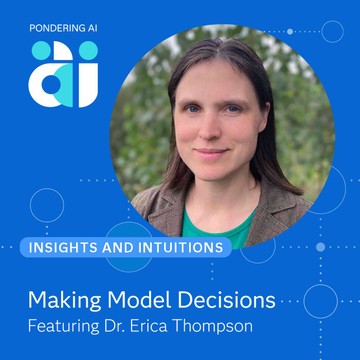
Dec 18, 2023 • 8min
Making Model Decisions w/ Dr. Erica Thompson
Dr. Erica Thompson, author of 'Escape from Model Land', discusses the flaws and biases in large language models like GPT and the importance of educating the public about their limitations. She emphasizes responsible usage of AI models, interdisciplinary collaborations, and societal implications for decision making in the future.


